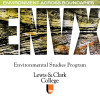Environmental Affairs Symposium 2007
October 2-4, 2007
Lewis & Clark College
Contemporary environmental discourse is dominated by talk of crises. When it comes to problems like toxic waste, species extinctions, and global warming, many people ask, “What can we do, and where do we begin?”
Unfortunately, these important questions often seem unanswerable because of the abstract and disconnected way we speak about environmental crises. To find answers, we may need to situate a crisis in particular places. Doing this lets us see how biophysical, historical, political, and cultural factors shape both the reality and the perception of the impending disaster. Perhaps after we have situated an environmental crisis, we will better understand what we can do about it.
Tuesday, October 2
Panel Session: Situating Environmentalism
4:00 PM, Templeton Student Center
What is an environmentalist these days? The so-called environmental movement takes different forms across the globe. Join keynote speaker Ramachandra Guha, an expert on environmental movements around the world, and Portland community members who do environmental work to discuss what makes an environmentalist.
Keynote Address: Crisis and Sustainability: Lessons from the Environmental Movement in India
7:00 PM, Templeton Student Center
Dr. Ramachandra Guha, Freelance Writer & Historian, Banagalore, India
Wednesday, October 3
Panel Session: Situating Environmental Science
4:00 PM, Templeton Student Center
How has environmental science created, promoted, or denounced mainstream and academic notions of crisis? Join keynote speaker Naomi Oreskes, professor of history and science studies, as well as experts from the Portland community to discuss the role of environmental science in framing crisis.
Keynote Address: Moving Beyond Crisis: Toward Sustainable Knowledge”
7:00 PM, Agnes Flanagan Chapel
Dr. Naomi Oreskes, Professor of History and Science Studies, University of California, San Diego
Thursday, October 4
Workshop: Strategies for Sustainability
4:00 PM, Albany Quadrangle, Smith Hall
Where do we go from here? Join us while student facilitators work with breakout groups to forge new narratives and plan new strategies of addressing crisis. Dr. Guha, Dr. Oreskes, and discussion panelists will be in attendance and respond to breakout group presentations.
For more information on the Symposium, please contact the Environmental Studies Program at (503) 768-7719 or envs@lclark.edu
2007 Symposium Readings
Ronald Bailey “Ecoscam: The False Prophets of Ecological Apocalypse”
T. Coraghessan Boyle “A Friend of the Earth”
Ramachandra Guha “How Much Should a Person Consume?”
Stephen Haller “Apocalypse Soon? Wagering on Warnings of Global Catastrophe”
Naomi Oreskes “The Long Consensus on Climate Change”
Naomi Oreskes “How Do We Know We’re Not Wrong?”
2007 Symposium Media
Podcast of Ramachandra Guha’s keynote address
Podcast of Naomi Oreskes’ keynote address
Images from the Symposium
Download the official Symposium poster
Environmental Studies is located in room 104 of Albany Quadrangle on the Undergraduate Campus.
MSC: 62
email envs@lclark.edu
voice 503-768-7790
Symposium Advisor Jim Proctor
Environmental Studies
Lewis & Clark
615 S. Palatine Hill Road
Portland OR 97219

